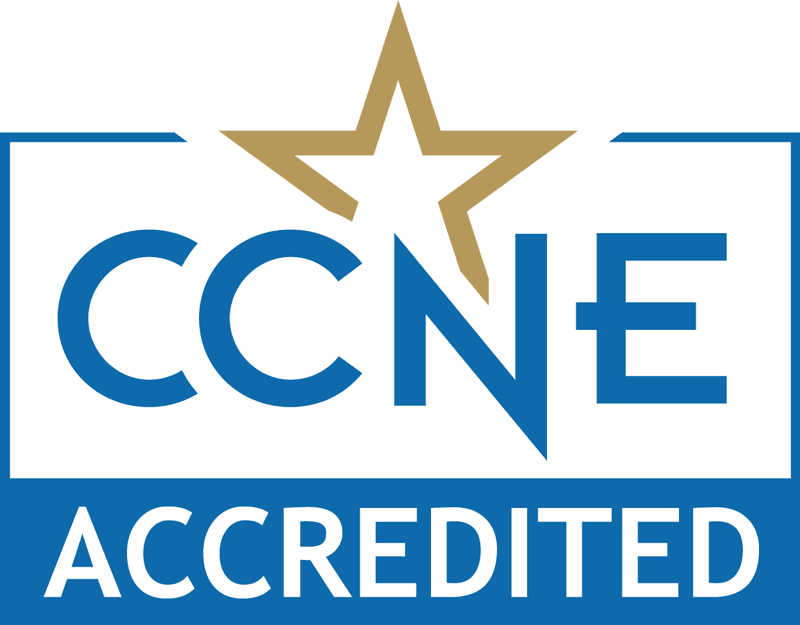Nursing
Online
MS
Program introduction and alerts
Earn your master's in nursing online
The Master of Science in Nursing (MSN) program prepares you to be a leader in nursing education and earn your MSN completely online. Courses are asynchronous, which allows you to learn on your schedule.
The MSN will provide the student with the foundational knowledge of healthcare systems, healthcare policy, nursing research methods, and healthcare informatics. You’ll apply your new knowledge in various practice settings, and a final capstone project prepares you for practice.
Starting with the summer 2026 session, you can complete the Master of Science in Nursing (MSN) in two years.
Program curriculum and details
Concentration
Nursing and Healthcare Education
Prepares you to become a nurse educator role in academic, clinical, or staff development setting. You’ll learn to design, implement, evaluate, and revise academic and continuing education programs for nurses. The curriculum integrates core masters-level concepts, advanced clinical foundations, and education-focused courses. It culminates in an intensive, individualized practicum of at least 126 hours. Each student collaborates with an experienced educator to grow in the role. Completion of the program provides graduates eligibility to become a Certified Nurse Educator (CNE®) through the National League for Nursing. View the Nursing and Healthcare Education program plan.
Degree Requirements
MS students complete 39 academic credits that include a mentored capstone project that involves the design, implementation and evaluation of an evidence-based innovation in nursing practice.
The MS in Nursing program prepares nurse leaders who:
- Synthesize specialized and diverse knowledge for application in nursing practice.
- Apply principles of organization and system leadership to promote high quality and safe patient care to individuals, families, groups, and populations.
- Apply quality principles within an organization.
- Use evidence to guide nursing practice, address patient problems, and disseminate results.
- Interpret information from a variety of healthcare technologies to integrate and coordinate care.
- Influence health system and health policy to shape care delivery to individuals, families, groups, and populations across the lifespan.
- Engage in inter-professional collaboration to promote health, guide clients through the illness experience, and improve the health system.
- Apply the principles of culturally appropriate care to plan, deliver, manage, and evaluate healthcare individuals, families, groups, and populations.
- Influence healthcare outcomes through nursing practice by integrating advanced scientific, clinical, and systems knowledge.
Application requirements
Applicants to the MS program must:
- Submit a statement of purpose (Minimum of 300 words)
- Submit a resume
- Submit official transcripts from all post-secondary institutions attended (regardless if a credential is earned or not)
- Hold a Bachelor of Science degree in nursing from a program accredited by the NLNAC or CCNE.
- Have a minimum GPA of 3.0 in undergraduate study.
- Registered Nurses with a bachelor degree in a related field may seek admission through the GAP program. (see below)
- Hold a current license to practice professional nursing in the state where you live.
- Submit 2 letters of reference that document competence, leadership and professional integrity in nursing practice.
Special Applicants
Registered nurses who hold a BS or BA degree in another field: the Graduate Admissions Program (GAP) is open to you. GAP students take NUR 503 Transitions Advancing Nursing Practice in which they complete a portfolio that documents how they attained undergraduate nursing program outcome objectives. Students will review portfolio with their academic advisor. Additional course(s) may be recommended to enrich their undergraduate preparation.
RN-BS student with GPA of 3.3 or better: With a recommendation from the RN-BS program director, you may take up to 9 graduate credits (from among the following courses: NUR 500, 511, 520, or 547) that count as undergraduate electives. If the student applies and is admitted to graduate study immediately after receiving the BS degree, the courses will also count toward the MS degree.
Program Accreditation
The master’s degree in nursing at the University of Massachusetts Dartmouth is accredited by the Commission on Collegiate Nursing Education, One Dupont Circle, NW, Suite 530, Washington, DC 20036, 202.887.6791.
More information
- Online & Continuing Education
- College of Nursing & Health Sciences
- Nurse Faculty Loan Program: offered to graduate nursing students enrolled in the MS or PhD programs who plan to become nurse educators
Learning style: online
Online courses are taught by UMass Dartmouth faculty to provide high quality instruction and personal attention. Students have the flexibility to accommodate work and home responsibilities within the structure of defined assignment due dates. The majority of our online courses are taught asynchronously.
Accreditations and distinctions

UMassD is a Military Friendly School, with leading practices in the recruitment and retention of students with military experience. Learn more about veteran services and benefits at UMassD.

The baccalaureate degree program in nursing, master’s degree program in nursing, and Doctor of Nursing Practice program at University of Massachusetts Dartmouth are accredited by the Commission on Collegiate Nursing Education.The post-graduate APRN certificate program at UMass Dartmouth is pursuing initial accreditation by the Commission on Collegiate Nursing Education. Applying for accreditation does not guarantee that accreditation will be granted.
/prod01/production-cdn-pxl/media/umassdartmouth/programs/online/AdobeStock_566596170-1600X400.jpg)
/prod01/production-cdn-pxl/media/umassdartmouth/online-continuing-education/us-news-best-online-grad-nursing-rgb-hex-no-footer-300X355.png?text=fallback200)